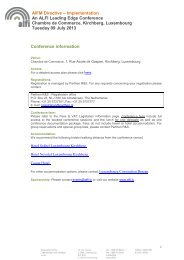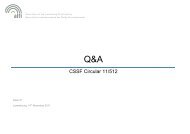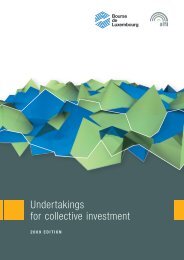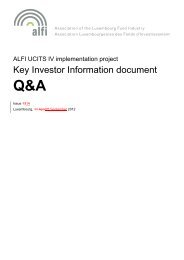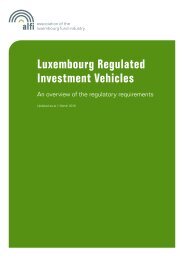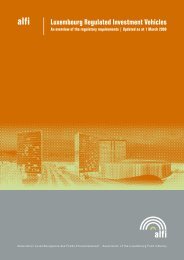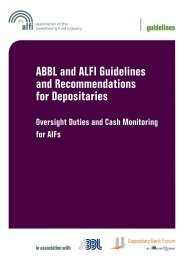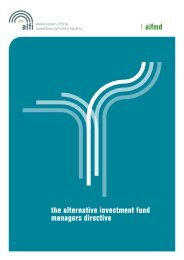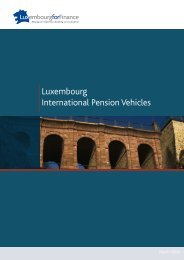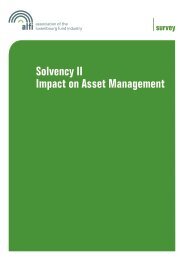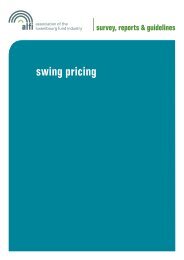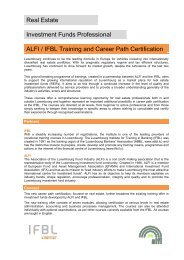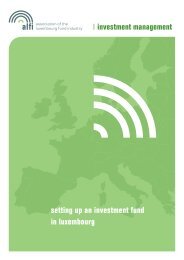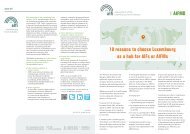Real Estate Investment Funds: Financial reporting - Alfi
Real Estate Investment Funds: Financial reporting - Alfi
Real Estate Investment Funds: Financial reporting - Alfi
Create successful ePaper yourself
Turn your PDF publications into a flip-book with our unique Google optimized e-Paper software.
y the seller. The assessment of the intended<br />
method of disposal should be substantiated<br />
and reviewed by the Fund management at<br />
each Fund NAV calculation date taking into<br />
account the most recent deals, changes in the<br />
market practice in each country, changes in<br />
the Fund structure and disclosure should be<br />
made in the financial statements explaining<br />
the approach applied.<br />
4. Who can be appointed<br />
as an independent<br />
valuer to a Luxembourg<br />
REIF?<br />
Assuming that an independent valuer<br />
(or appraiser) will be appointed:<br />
a. The Fund should appoint one or more<br />
independent real estate valuation professionals/<br />
companies who are licensed where appropriate<br />
and who operate in the jurisdictions where any<br />
relevant properties are located.<br />
b. Independent valuers should be adequately<br />
qualified and experienced in the markets they<br />
operate. Details of the intended arrangements<br />
with independent valuers should be disclosed<br />
in fund documentation and may be<br />
scrutinised by the CSSF.<br />
c. The valuer must be independent, i.e. should<br />
not be an affiliate of the fund manager, the<br />
property manager or the investors. When<br />
other services are also provided by an<br />
independent valuer that could possibly affect<br />
independence, these must be disclosed. It is<br />
also good practice to establish the fees of<br />
external valuers on a basis which is<br />
independent of the outcome of the valuation<br />
(i.e. not linked to the value).<br />
d. Valuers should prepare their reports in<br />
accordance with a recognised property<br />
valuation standard (e.g. ISVC/RICS/<br />
TEGOVA, see Chapter I.2 above), and should<br />
only value properties where they can act as<br />
independent valuer, without any conflicts of<br />
interest arising due to other connections with<br />
the subject property, e.g. appointment as<br />
investment agent, property manager, letting<br />
agent or valuer for another party.<br />
e. As recommended by INREV, an assessment<br />
of the re-appointment of the external valuer<br />
should be made at least every 3 years.<br />
f. The name of the independent valuer(s)<br />
should be indicated in the annual financial<br />
statements for each year, including which<br />
properties each valuer has valued. In some<br />
cases, their valuation report to the Fund is<br />
included in the annual financial statements.<br />
5. What is an<br />
acceptable property<br />
valuation frequency?<br />
a. CSSF Circular 91/75, and in other cases<br />
(see Chapter VI.2) common and best<br />
practice, dictates a minimum of annual<br />
independent valuations. Under INREV,<br />
external property valuations are also<br />
performed at least annually for all properties,<br />
with (desktop) internal or external updates in<br />
line with the <strong>reporting</strong> frequency of the fund.<br />
b. A significant number, especially if they are<br />
semi-open or open-ended, of Luxembourg<br />
REIFs commission quarterly valuations, which<br />
are typically carried out as a full valuation once<br />
per year and 3 "desktop" valuations.<br />
c. For larger portfolios, a rolling cycle of full<br />
valuations throughout the year is considered<br />
practical, with desktop updates for the<br />
remaining quarterly valuation points. Such<br />
arrangements would need to be agreed with<br />
the CSSF as part of the approval of the Fund<br />
Documentation. Refer also to considerations<br />
in Chapter II.3 regarding how recent a<br />
valuation should be.<br />
d. In all cases, any exceptional events which are<br />
likely to significantly affect the value of a<br />
fund’s portfolio or individual properties may<br />
require an "out of cycle" adhoc revaluation.<br />
The decision to call for such a revaluation is<br />
the responsibility of the Fund’s Management.<br />
Such events may include economic, interest<br />
rate, political, market, sector, physical and/<br />
or tenant-related issues.<br />
e. The Fund management is under a general<br />
obligation to ensure that a best estimate of<br />
fair value is used at every Fund NAV<br />
calculation date, taking account of all relevant<br />
information known to the Fund management<br />
at the Fund NAV calculation date.<br />
7



